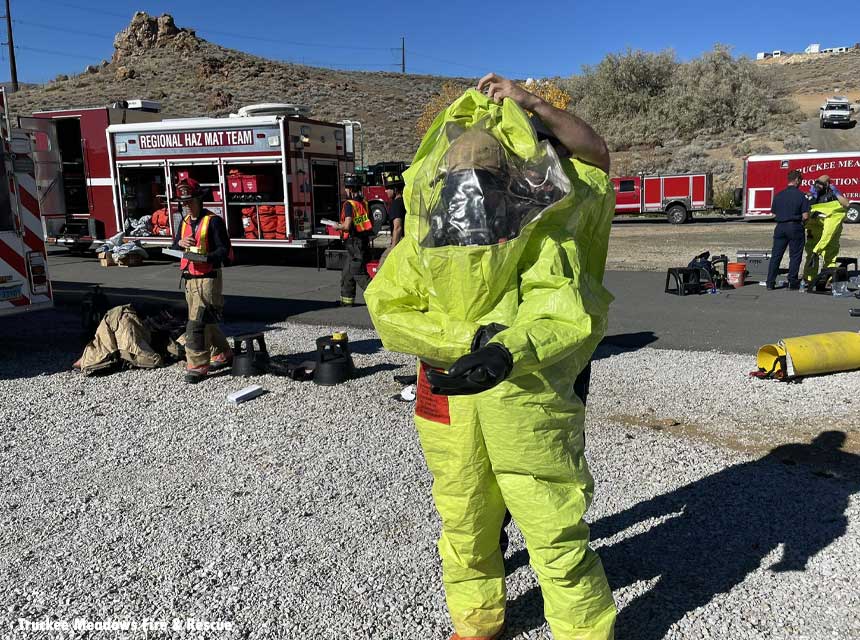
Every fire department has them—or should. A group of specialists who get called to the scene of gas leaks, tanker leaks, and “unknown substances” that potentially threaten the community. These specialists who perform hazmat duties are colloquially called “glow worms” because of the color of the encapsulating suits they wear and because once they have been on the team for a while, they will say they have been around so much hazmat it will make them glow in the dark!
No one really wants their firefighters to glow due to chemical exposure even though jokes about glowing are frequently made. However, building a robust hazmat response capability within a jurisdiction can be extremely costly. Specialty apparatus, equipment, personal protective equipment (PPE), and training is needed; the maintenance and ongoing training costs can also be significant. Often, regions share hazmat assets because of their cost and infrequent use. If your department has not explored grant funding specifically for hazmat resources, apparatus, or training, the new year is a great time to begin evaluating your department’s capabilities and determining how the program can improved.
So where’s the best place to find hazmat grants? Hazmat grants can come from a variety of places, but the majority of federal funding to departments each year comes through the U.S. Department of Transportation’s Pipeline and Hazmat Safety Grants Program (PHMSA)1. The funds in this program also support the Emergency Response Guide (ERG) and all the work associated with its maintenance and upkeep. This program is funded by fees collected from shippers of hazardous materials who transport the materials. For 2021 PHMSA awarded over $98 million in grant funds for 11 different pipeline and hazmat grant programs2. The hazmat programs include the Hazardous Materials Emergency Preparedness (HMEP) grant, the Assistance for Local Emergency Response Training (ALERT) grant, the Hazardous Materials Instructor Training (HMIT) grant, Supplemental Public Sector Training (SPST) grant, and the Community Safety (CS) grant. There are grant program offices within the states and territories that manage access to these programs as well as access to the portal used to process funding and requests3. If you are unsure of where the grant program office is for your jurisdiction, you can contact the grant program office at PHMSA for guidance. The PMHSA website also has a wide variety of online hazmat and pipeline educational resources readily available.
The Gray Area: Firefighter Rescue and Hazmat
FEMA grants are also available for hazmat use. The Assistance to Firefighters Grant (AFG) provides funds for a variety of training and equipment needs. There are some other programs available that can also be used for hazmat purposes in accordance with their Notice of Funding Opportunity (NOFO). These are the Port Security Grant Program (PSGP) and the Emergency Management Performance Grant Program (EMPG). These grants are managed by one program office for each state and territory. Prior to applying for the grants, it is necessary to contact the appropriate office4. It is important to note that even though these grants may not seem applicable, the NOFO does allow for hazmat within each. Note that the items or training requested must be presented in the application according to the directions in the NOFO. For example, the PSPG grant NOFO appendix states: “For example, a project could be to procure a boat specifically designed and equipped as chemical, biological, radiological, nuclear and explosives (CBRNE) detection, prevention, response, and/or recovery platform. The Investment Justification (IJ) template for this example project should include the CBRNE equipment in the same IJ as the vessel.”5 Simply writing a request for a boat without proper justification would not result in approval.
Although the lion’s share of hazmat grant funding comes from federal sources, there are private resources available as well. CHEMTREC services, a company the serves as an emergency call center for hazmat incidents, offers a Hazmat Emergencies Local Preparedness (HELP) grant. This grant is offered in partnership with the National Volunteer Fire Council (NVFC). In 2021, five fire departments were awarded $10,000 each to enhance their response and preparedness capabilities. To qualify for this grant, a department must be at least 50-percent volunteer, serve a population of 25,000 or less, and have fiscal year funding of no more than $250,000. The grant application period is currently closed; however, the CHEMTREC HELP grant office can answer questions from your department pertaining to the next grant cycle6.
Hazmat and pipeline emergencies can happen anywhere and it is important for jurisdictions to be prepared with the proper equipment and training in order to protect the community and their first responders. We make jokes about glow worms, but hazmat safety is no laughing matter. Take stock of your response capabilities and get ready for the next grant cycle. Have a wonderful New Year!
- https://www.phmsa.dot.gov/grants/hazmat/hazardous-materials-grants-program
- https://www.phmsa.dot.gov/sites/phmsa.dot.gov/files/2021-09/PHMSA%20FY21%20Comprehensive%20Grants%20Report_0.pdf
- https://hazmatgrants.phmsa.dot.gov
- https://www.fema.gov/about/organization/regions
- https://www.fema.gov/sites/default/files/documents/FEMA_2021-Preparedness-Grants-Manual_02-19-2021.pdf
- https://www.chemtrec.com/chemtrec-services/emergency-responders/help-award

Mandy George is a retired lieutenant in the Chesapeake (VA) Fire Department. She has a master’s degree in emergency and disaster management, a master’s degree in professional writing, and an associate’s degree in emergency medical services. She is also a Nationally Registered Paramedic (NRP) and a Virginia Office of Emergency Medical Services (VAOEMS) Education Coordinator.
MORE MANDY GEORGE
Grants to Give the Gift of Life

